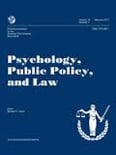Mothers’ knowledge of the justice system may influence juvenile re-offending. This is the bottom line of a recently published article in Psychology, Public Policy, and Law. Below is a summary of the research and findings as well as a translation of this research into practice.

Featured Article | Psychology, Public Policy, and Law | 2017, Vol. 23, No. 2, 141-153
What They Don’t Know Can Hurt Them: Mothers’ Legal Knowledge and Youth Re-Offending
Authors
Caitlin Cavanagh Michigan State University
Elizabeth Cauffman University of California, Irvine
Abstract
Juvenile offenders may be too young to manage the terms of their probation independently; a parent’s participation in the probationary process is critical for youths’ successful transition to crime desistence. However, a parent’s capacity for support during his or her child’s legal process may depend on the parent’s knowledge of how the justice system operates. The present study is the first to quantify mothers’ knowledge of the juvenile justice system. The authors examine the association between mothers’ legal knowledge, legal participation, and youth re-offending using a longitudinal sample of 324 dyads (total N 648) of mothers and their sons, all first-time juvenile offenders. Results indicate that mothers averaged a 66% out of 100% on a test of legal knowledge. Importantly, those mothers who knew the least about the system also participated the least in their son’s legal process, and mothers who participated the least had sons who self-reported re-offending more within the first year after his arrest. Practitioners are encouraged to educate parents of juvenile offenders about their rights and responsibilities in the courtroom and on probation, to create meaningful avenues for parental involvement, and to set youth up for success after a first arrest.
Keywords
justice system knowledge, juvenile justice, parenting, delinquency
Summary of the Research
“Juvenile offending inflicts high costs on individuals, families, and communities. A principal goal of the juvenile justice system is to ensure that youthful offenders desist from crime during and after their time on probation, as re-offending results in prolonged justice system involvement. However, juvenile offenders may be too young to independently manage all the terms of their probation (e.g., transportation to court appointments, understanding of the court system, finances to pay for court fees, etc.). For this reason, a parent’s capacity to provide support during the probationary process is critical for a youth’s successful transition to crime desistence” (p. 141).
“Parental engagement and support is key to youth success in academic settings, autonomy development, relational competence, and a host of other domains. For example, parents who participate more in their children’s education (e.g., attending parent–teacher conferences, making sure that homework is completed) have children who are more successful in school. It is also likely that parents who participate more in their children’s legal proceedings (e.g., attending court dates and meeting with probation officers) will have children who are more successful in crime desistence after their first arrest. Indeed, it is assumed that parental involvement in youths’ legal proceedings after an arrest is important. Yet, the relation between parents’ participation in legal proceedings and youth re-offending has not been tested directly.” (p. 141).
“As a result of children’s well-recognized dearth of legal knowledge, a foundational expectation of the juvenile justice system is that parents partner with the system and help guide their youths through the process. However, there is a great deal of contradiction regarding what role parents are expected to play in their children’s legal proceedings. On the one hand, parents are expected to protect their children’s legal welfare (e.g., monitoring and enforcing probation terms, providing practical assistance such as transportation to court appointments). On the other hand, parents may also be expected to partner with legal actors in a way that might not be considered in their children’s best interest. For example, a parent may report his or her child’s violations to his or her probation officer, or encourage the child to make a confession for moral, rather than legal reasons…Given these tensions and inconsistencies in the proper role of parents in the court room, a thorough knowledge of the juvenile justice system is necessary for parents to understand their role in aiding their children” (p. 142).
“Troublingly, a large-scale national review of parental involvement in juvenile courts concluded that there are few resources available to educate parents in the juvenile justice process. Indeed, many probationary programs offer little or no education for parents as far as their family’s rights and duties. Among laypeople, knowledge about the law is limited, and no previous research has comprehensively measured parents’ knowledge of legal rights and responsibilities within a juvenile justice setting. Despite the expectation that parents will help their children meet their legal requirements, it is not presently known whether parents have the requisite knowledge to do so. For example, if a parent does not know that conversations with a youth’s probation officer are not confidential, the parent may reveal incriminating evidence to their son’s probation officer, resulting in harsher sanctions or extended probationary terms” (p. 142).
“The current study extended the present literature in two important ways: First, we examined a sample of justice-involved parents and adolescents to improve the ecological validity of the study. Second, the present study evaluated parents’ legal knowledge about the juvenile court and probation (back-end processes following an arrest), rather than police interrogations (front-end processes that precede an arrest). Doing so assessed gaps in parents’ knowledge associated with youth re-offending after his first arrest, an important juncture for youth desistance from crime” (p. 143). The study focused on female parents specifically due to less reliable access to male parents in this sample. Participants were selected from the Crossroads study and consisted of 324 mother-son dyads.
“Overall, mothers received an average score of 65.99% out of 100% on the measure of legal knowledge. Many of the frequently missed questions (20 –29% correct, on average) seemed to be those regarding the roles and duties of a probation officer and the plea decision. The questions most frequently answered correctly (93– 99% correct, on average) were those regarding courtroom procedure (e.g., the right to an interpreter in the courtroom, a warrant will be issued if a youth does not appear for his court date, court-ordered counseling may be mandated)” (p. 147).
Mothers who had been arrested themselves, had higher education levels, and those with higher household income knew more about the legal system. Racial differences on knowledge of the legal system were also found such that Latina women knew the least about the legal system followed by Black women and then White women. Women who were born in the United States and those who spoke fluent English were also more knowledgeable about the justice system.
“Because our sample consisted of youth and mothers who had just experienced their first encounter with the justice system, the present study is uniquely qualified to test the typical knowledge and participation of families who are entering the justice system for the first time. Several important findings emerged from the study. First, we find that mothers, in general, averaged 66% correct on a series of questions designed to test their knowledge of the juvenile justice system. Second, mothers who knew less about the juvenile justice system also participated less in their sons’ legal proceedings. Third, those mothers who participated less had sons who were more likely to report engaging in re-offending behavior. Overall, our results suggest that a mother’s legal knowledge is associated with her legal participation, as well as her son’s re-offending behavior after his first arrest” (p. 149).
Translating Research into Practice
“Mothers’ overall lack of knowledge about the juvenile justice system is troubling; particularly striking is the knowledge disparity among women. Results from the present study shed light on one mechanism through which juvenile offenders from minority and low SES families may be at a disadvantage in the juvenile justice system: their legal knowledge. Household income, primary language, and race were associated with less knowledge of the justice system. Although it may seem counterintuitive that mothers’ education attainment was not associated with legal knowledge, this is likely because of the dearth of legal/civic instruction received during postsecondary education. As baccalaureate degrees become increasing specialized, higher educational attainment may not guarantee exposure to knowledge of legal and civic issues. Indeed, only through specific legal training is it likely that more education would amount to greater knowledge of the justice system” (p. 149).
“To reduce youth re-offending after his first arrest, a youth’s primary support system— his parents—must be informed and engaged about the process. This is particularly true of parents who, absent other intervention, may be at a disadvantage in helping their children navigate the juvenile justice system. Indeed, previous research suggests that limited parental involvement in juvenile court processes is not typically attributable to poor parenting, but rather to life stressors. The present study extends this research by suggesting that lack of knowledge may be a reason that parents are less involved with their children’s legal process” (p. 150).
“Perhaps the most important finding from the present study is that we suspect a downstream effect of a mother’s legal knowledge to her legal participation, to her son’s success after an arrest. The benchmark for appropriate participation may be unclear for some parents. Yet, our results indicate that mothers’ participation in the legal process is associated with reduced youth re-offending, even above and beyond the effect of youths’ prior offending behavior. Because mothers with greater knowledge of the justice system had sons who re-offended less, educating mothers about the juvenile justice system may be a critical point of intervention to improve youth probationary outcomes. This is especially important for families who are linguistic and racial minorities, as well as those from lower socioeconomic backgrounds, given that these families displayed the least legal knowledge in the present findings. Indeed, results from the present study suggest that the families most in need of an education intervention are the very families whose children are often overrepresented in the juvenile justice system” (p. 151).
Other Interesting Tidbits for Researchers and Clinicians
“Interestingly, Latina mothers showed the highest participation in youth legal proceedings. Parenting values and child rearing practices vary among different cultures. For example, the idea of familismo (a strong, loyal family unit) is highly valued in the Latino culture. Although familismo was not measured in the present study, it could be that Latina women displayed the highest participation because the sense of family unity is culturally salient within Latino families. Because strained family ties are associated with increased psychological distress among Latina women, it stands to reason that Latina mothers in the present sample may have stood by their sons after his arrest to reaffirm the strength of the family’s relationship” (p. 150).
“The results from the present study suggest that legal education should be a key component of parental involvement in legal proceedings. Although youth are not obligated to follow the advice of their parents but rather have the right to a client-centered attorney to advocate for them, children are more successful in completing their probationary terms and desisting from crime when their parents are included in the legal process. Just as schools foster parental engagement in their children’s education, so too should probationary programs educate parents on how they can help their youth succeed after an arrest. By giving parents the knowledge they need to navigate the justice system, parents will be better situated to truly partner with probation to help their youth succeed after a first arrest” (p. 151).
Join the Discussion
As always, please join the discussion below if you have thoughts or comments to add!






















